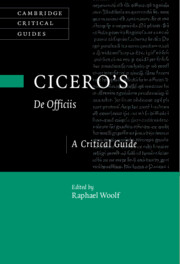Book contents
- Cicero’s De Officiis
- Cambridge Critical Guides
- Cicero’s De Officiis
- Copyright page
- Contents
- Contributors
- Acknowledgements
- Abbreviations
- Introduction
- Part I The Framework of De Officiis
- 1 The Family in De Officiis
- 2 Conflict of Duties in Cicero’s De Officiis
- Part II The Role of Virtue
- Part III Exemplary Ethics
- Part IV Self and Society
- Part V Politics
- References
- Index
- Cambridge Critical Guides
1 - The Family in De Officiis
from Part I - The Framework of De Officiis
Published online by Cambridge University Press: 15 June 2023
- Cicero’s De Officiis
- Cambridge Critical Guides
- Cicero’s De Officiis
- Copyright page
- Contents
- Contributors
- Acknowledgements
- Abbreviations
- Introduction
- Part I The Framework of De Officiis
- 1 The Family in De Officiis
- 2 Conflict of Duties in Cicero’s De Officiis
- Part II The Role of Virtue
- Part III Exemplary Ethics
- Part IV Self and Society
- Part V Politics
- References
- Index
- Cambridge Critical Guides
Summary
In De Officiis, Cicero values very highly the little society of parents and their children: an origin of society and seedbed of the republic, whose members should rank extraordinarily high among each other’s priorities. In light of Cicero’s biography and longstanding interest in a philosophical debate about parental love, I argue that Cicero’s position is that nature gives to humans a non-rational desire to care for their children, which leads many parents to rational love of their children, whereby they care about what is natural for at least some other humans, their children, as they care about it for themselves, holding property in common within the household. The rest of the family thereby learn loving attitudes. Such parents and their home are for their children images, however flawed, of virtue and a virtuous society. By making this experience common, nature teaches a lesson in what virtuous altruists would be like.
- Type
- Chapter
- Information
- Cicero's ‘De Officiis'A Critical Guide, pp. 15 - 41Publisher: Cambridge University PressPrint publication year: 2023

